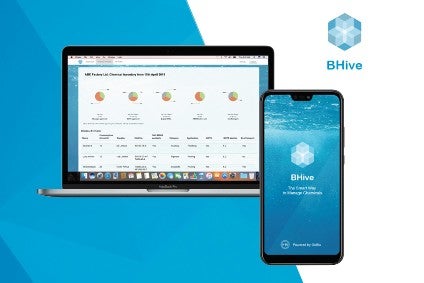
International brands and retailers including Bestseller, Lindex, Orsay, Li & Fung, Lidl and Tchibo are piloting a new chemical management app that gives an at-a-glance view of chemical usage in their global supply chains.
Launched in response to rising concern over toxic chemicals in the fashion industry, the BHive app developed by sustainability accelerator GoBlu International provides an immediate snapshot of the chemical products used at wet processing facilities and whether they meet brand requirements.

Discover B2B Marketing That Performs
Combine business intelligence and editorial excellence to reach engaged professionals across 36 leading media platforms.
It uses optical character recognition (OCR) technology to allow manufacturing facilities to take smartphone photos of chemical product labels, and within seconds identify which products meet the sustainability requirements of their supply chain partners.
Once uploaded, all scanned chemicals are cross-referenced with the BHive’s database – currently backed by over 45,000 chemical products – and the system automatically generates a full and accurate chemical inventory. Facilities can then instantly and visually assess compliance levels, and see which chemicals they should keep using and which they should phase out.
Wet processing chemical inventories
Traditionally, brands and retailers have struggled to collect good quality information from the wet processing facilities that carry out their dyeing, washing, and printing. Data that could be gathered then required manual screening by individuals with specialised technical knowledge.

US Tariffs are shifting - will you react or anticipate?
Don’t let policy changes catch you off guard. Stay proactive with real-time data and expert analysis.
By GlobalDataWith the BHive, technical expertise isn’t required to gather data on the factory side, or to interpret it on the brand side, GoBlu says.
For manufacturers, the new tool helps create chemical inventories easily and quickly, with less time spent entering and checking data, or comparing the compliance of chemicals against conformity documents. It also enables them to demonstrate their commitment to improving chemical compliance.
For brands and retailers, benefits include instant access to accurate data centralised across the supply chain, allowing them to track performance and meet stakeholder expectations on chemical monitoring.
There are gains for chemical companies, too, such as understanding which brands and factories are using their chemicals, and the ability to promote new product releases to brands, retailers and factories.
So far, more than 100 factories have been enrolled into BHive in seven countries: Bangladesh, China, Myanmar, Romania, Sri Lanka, Turkey and Vietnam.
“Over the years, we have witnessed how wet processing facilities struggled to provide clear and correct information in terms of which chemical products they use on site and whether those products meet brand requirements,” explains Lars Doemer, managing director of GoBlu International.
“We are confident that this scalable, cost-effective, and simple-to-use app will bring visibility to the chemicals used by these facilities. By enabling this new level of transparency, we hope to spark action and together shift towards a cleaner supply chain.”
His comments are endorsed by Ann-Karin Dahlberg, corporate sustainability manager at Lindex, who says: “Increased speed and reduced workload are the major benefits we are already seeing from using BHive to implement our new MRSL. We see these benefits within our own business as well as on the supply chain side, and feedback from our supplier is really positive. Our aim is to roll BHive out to our global supply chain.”
At Bestseller, “we are working toward some ambitious sustainability goals over the next few years,” explains environmental sustainability manager Felicity Tapsell. “For us to achieve these goals we need accurate data at our fingertips. We’ve found BHive to be just what we need. We’ve never before had this kind of transparency regarding our suppliers’ chemical use, and the best part is that it is so easy to understand.”
And for Yvonne Swoboda, team leader corporate responsibility, at Orsay: “The BHive supports our due diligence approach by visualising potential risks related to the use of hazardous chemicals and by easing the tracking of the progress made in phasing out such chemicals.”
Other brand/retailer partners include Bay City, Baumhueter International, Brands Fashion, Güldenpfennig, Solidaridad, SympaTex, Varner and Wünsche Group.
Major industry standard holders and chemical manufacturers supporting the tool are Oeko-Tex, GOTS, Anoky, Argus, Atul, Beyond Surface, CHT, Chroma, Colourtex, Dr Petry, DyStar, Eksoy, Everlight Chemicals, HEIQ, Jihua Group, Jinji Dyestuffs, Lonsen, Pidilite, Nearchemica, Rossari, Rudolf Group, Runtu, Setas, S&D chemicals, Taiwan Surfactant, Transfar, Wholewin and Yorkshire Group.





